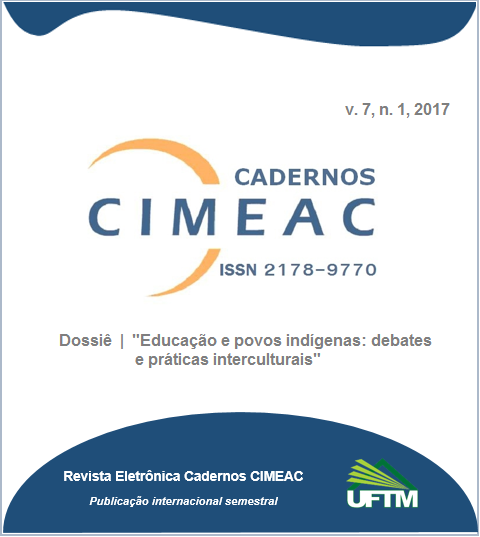Educação e aprendizagem de indígenas Terena: considerações éticas a partir de um estudo etnopsicológico / Education and learning of indigenous Terena: ethical considerations from an ethnopsychological study
DOI:
https://doi.org/10.18554/cimeac.v7i1.2167Resumo
Aspectos e interlocutores de uma pesquisa etnopsicológica com indígenas terena da aldeia Kopenoty na Terra Indígena de Araribá, no município de Avaí – SP – suscitam a reflexão ética sobre práticas educativas na escola indígena no ensino fundamental e do contato escolar com não indígenas em contexto urbano no ensino médio e superior, em que se relatou e se observou o não reconhecimento de formas étnicas particulares de aprendizagem e suas decorrências em espaços supostamente interculturais. Considerou-se a exclusão e o antecedente de dificuldades históricas enfrentadas pelos povos indígenas e suas consequências na configuração atual entre povos indígenas e a educação regular, em que existe uma relação de subordinação a modelos etnocêntricos. Também se aponta como o modelo de conhecimento não indígena afeta as instâncias da escola indígena, do ensino fundamental ao ensino superior, como as práticas informais de aprendizagem que são interpeladas pelo formato de aprendizagem e valores não indígenas e assim são desvalorizadas. A reflexão conduziu para a necessidade de, em todas as instâncias mencionadas, reconhecer os terena como tradutores culturais, enquanto capazes de se apropriarem das diversas concepções de conhecimento a partir de seus valores particulares à fim de que possam se relacionar com a aprendizagem de forma não subalterna ao modelo etnocêntrico.
Palavras-chave: Educação; Povos indígenas; Escuta psicológica; Interculturalidade.
ABSTRACT: Aspects and interlocutors of an ethnopsychological research with indigenous Terena from the Kopenoty village in the Araribá Indigenous Territory in the city of Avaí - SP - raise ethical reflection on educational practices in the indigenous school in elementary school, and on school contact with non - indigenous people in urban context in the secondary and higher education, in which the non-recognition of particular ethnic forms of learning and their consequences in supposedly intercultural spaces was observed and reported. The exclusion and antecedents of historical difficulties faced by indigenous peoples and their consequences for the current configuration between indigenous peoples and regular education was considered, in which there is a relation of subordination to ethnocentric models. It is also pointed out how the non-indigenous knowledge model affects the instances of indigenous school, elementary education and even higher education, as well as informal learning practices that are questioned by regular learning format and non-indigenous values and thus are devalued. Reflection has led to the urgence, in all instances, to recognize the terena as cultural translators, while being able to appropriate diverse conceptions of knowledge from their particular values so that they may relate to learning in a not subaltern way to the ethnocentric model.
Keywords: Education; Indigenous peoples; Psychological listening; Interculturality.
Downloads
Publicado
Edição
Seção
Licença
Os autores que publicam nesta revista concordam com os seguintes termos:
(a) Não cobramos dos autores para a publicação neste periódico.
(b) Autores mantém os direitos autorais e concedem à revista o direito de primeira publicação, com o trabalho simultaneamente licenciado sob a Licença Creative Commons que permite o compartilhamento do trabalho com reconhecimento da autoria e publicação inicial nesta revista.
(c) Autores têm permissão e são estimulados a difundir e a distribuir a versão publicada de seu trabalho online (ex.: em repositórios institucionais ou na sua página pessoal) após o processo editorial, já que isso pode aumentar o impacto e a citação do trabalho publicado (Veja O Efeito do Acesso Livre).
* * *
AUTHORS COPYRIGHT AND PUBLISHING RIGHTS
Authors who publish with this journal agree to the following terms:
(a) This journal does not charge authors for publication.
(b) Authors retain copyright and grant the journal right of first publication with the work simultaneously licensed under a Creative Commons Attribution License that allows others to share the work with an acknowledgement of the work's authorship and initial publication in this journal.
(c) For authors whose articles have been accepted: authors are permitted and encouraged to post their work online (e.g., in institutional repositories or on their website) after the publication of the text in Cadernos CIMEAC, as it can lead to productive exchanges as well as earlier and greater citation of published work (See The Effect of Open Access).

 10.18554/cimeac
10.18554/cimeac

